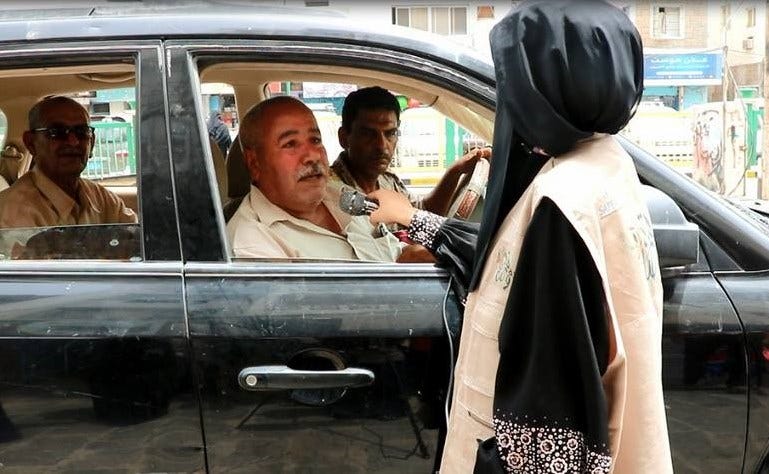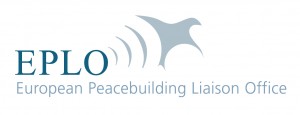Door-to-door Disarmament: Communities in Yemen building safety and security from the ground up
People in Yemen are often portrayed as passive observers of the violence that is racking their country. But there are communities challenging this perception and working to increase their own day-to-day safety and security.

A 60-year old Yemeni woman goes door-to-door in her community, encouraging people to turn in their weapons. She can be found talking to young armed people from the neighbourhood in the popular spots where they hang out. She is called on to help when there are issues between families. She has even taken her disarmament campaign home, confiscating weapons from family members serving in the military when they come from work and returning them before their next shift. She is walking proof that there are no more dedicated peacebuilders than people who have found themselves stuck living in a protracted situation of violence.
Awfa Al-Naami manages the EU-funded project on community safety and enhancing women’s role in peace and security that trained the woman in question and she is convinced that it will take a groundswell of grassroots local action and support for peace to bring an end to Yemen’s devastating violence. “Even without the large-scale fighting, there is still conflict. We can’t resolve conflicts only at higher level if the same root causes and issues remain. Decisions from up high won’t resolve this. Peace has to happen at all levels,” says Al Naami, Country Manager for Saferworld in Yemen.
Aden is a case in point. Airstrikes may have ceased and Houthi fighters may have withdrawn to the north but residents are still living with assassinations, bombings and the tug-of-war for control of the city. The economic situation is dire. There is little work, save for enlistment in the military. The lack of agency can be demoralizing and demotivating. People get more and more dependent on the authorities and others to solve their issues. When Saferworld set up the project, the spirit of volunteerism was low. But even after the first training session, they saw a 180 degree change, with participants describing ‘no longer feeling invisible’ and fired up with ideas on how be more active to help their communities.
The project also worked in Ibb, over 200 kilometres inland from Aden. This region faces a different type of security problem. There are high numbers of internally-displaced persons (IDPs). As the economy failed, even those that continued to work in some cases had not been paid for almost nine months. And, like Aden, the desperate economic situation has pushed some to join armed groups to be able to earn a salary or just have something to do.
The idea for the project was the result of collaboration between the UK conflict prevention and peacebuilding NGO, Saferworld, and two Yemeni humanitarian organisations: Wugood, based in Aden and the National Foundation for Development and Humanitarian Response, working all over the north of Yemen. To fine tune the design of the project and make it as relevant for residents as possible, the partners worked with the Yemen Polling Centre to do pre-project surveys and focus groups.
Community groups in Aden and Ibb took part in training seminars on everything from problem analysis and conflict sensitivity to finance management and gender awareness and after a series of workshops, the groups of mixed ages, genders, education levels and backgrounds worked together to identify and prioritise the local security issues they wanted to tackle. The disarmament campaign that inspired the 60-year old former activist was one such initiative. The group planned and organised a whole campaign of activities in their local community to advocate for disarmament, even making a short video.
The scarce funding for local community initiatives can be a real obstacle. Because peace is not something that can be ‘delivered’, initiatives often face scepticism from those more familiar with goods and services provided by humanitarian aid.
“Some people in the local authorities couldn’t envisage how you could do a peace project during war, but peace is more of a seed, an investment in the community. It takes time to lay the groundwork and yield impact,” says Al-Naami.
She knows what it’s like to have life plans derailed by conflict. She studied architecture at university, took Japanese classes on the side and, after graduating, joined the Japan International Cooperation Agency working on development programming. That all ended when the conflict broke out. But, undeterred, she left to pursue an MBA in Hyderabad, India to get the job skills to return and work with NGOs.
“It’s the people that keep me optimistic. It’s not easy, but you see how much you’re doing, being able to spark a change in this person or that person. It gives you the motivation to go on. As a Yemeni, right now this is the only thing I’m able to give to my country. If I weren’t doing this, I’d be really frustrated.”
Interviews and article by Terri Beswick.
